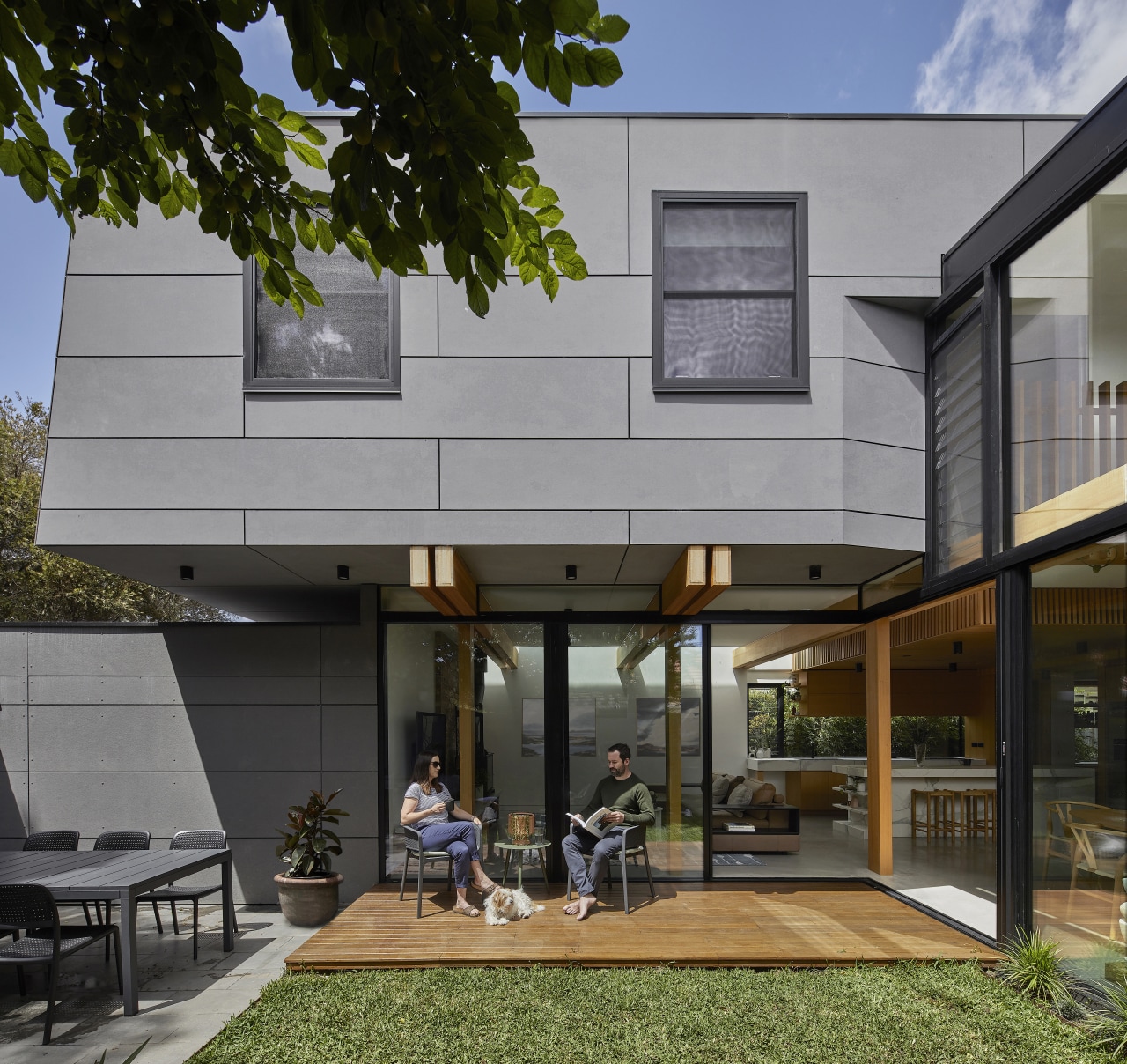Space and delight
A picture of tradition at the front, this home is transformed, extended and opened up at the rear with an emphasis on natural materials and sustainability
Designed by mcmahon and nerlich
From the renovating architects:
This is a home of space and delight, anticipating shifts towards blurred divisions of home, work and leisure – an exemplar for sustainability and joy.
Perception of timber-clad elements, natural light and spatial complexity, together with smart home tech, combine to inform an anchoring design through which memory and connection to place occur.
- The brief was to radically transform the dark deteriorating Edwardian home into one of light and spatial flow, to deliver this modest home on a strict budget.
- Also to be considered was zoning – to allow for proximity of younger children now yet provide room for the children to grow into adults.
Owner, site and surroundings informed the development of plan and form.
- The red-brick and terracotta roofscape and streetscape of Californian bungalows formed surrounding heritage context – outdated planning policy discouraged two-storey additions behind this fabric, and encouraged new built form to be centrally dispersed, however this was unsuited to good solar orientation and prevented a garden.
- Combined areas were too large for the site; a compact solution was achieved with the L-shape configuration, overlapping circulation zones and cantilevers which reduced circulation and provided sun-shading.
- We radically re-dispersed form on site, proposing form along the south boundary, allowing for a north-facing garden and indoor-outdoor connection, despite this being against heritage planning policy.
- A two-storey glazed link, cantilevers and multiple iterations of 3D renders tailored to suit council feedback convinced council that the grey-clad addition could be sensitive to the heritage surroundings.
Functionally, the house is an exemplar – seamlessly combining creative, spatial, theory, sustainable, country, and smart-home tech elements.
- Spatial planning celebrates timber materiality – we pushed the architectural solution to clad the modest steel structure below the ceiling line with timber, setting up repetition of elements, light and shadow as you enter, moving in parallax past timber-clad posts and beams which frame garden views and add a temporal dimension.
- Layouts focussed on zones, creating flexibility – the owners can work in dedicated acoustically separate studies, tucked into the link between old fabric and new fabric at ground and first floor – solving the issue of needing proximity to the younger kids now while allowing for adults and older kids to entertain in separate zones in the future.
- Smart home tech significantly improves sustainability – fronted by Apple Home, with security alarm, cameras, door locks, electric gate and garage door, all lighting, ceiling fans, televisions, multi-room audio, heating/cooling, irrigation and blinds controlled via automation, voice, iphone, Apple watch or ipad from anywhere in the world – the house can be shut down and security alarm-armed when hitting the exit button on the way out the door, via voice command or from anywhere in the world via app, significantly reducing energy use.
- Automatic closing of the west facing blinds when the sun is hitting the windows on a summer's day further improves operational efficiency.
- Solar panels, all-electric installation, rainwater collection with rain gardens, low VOC materials / low embodied energy / longevity of material also improve sustainability.
- First Nations notions of connection to country and landscape, similar to the theory of genius loci or “spirit of place” (Christian Norberg-Scultz), inspired placement of windows, skylights, bamboo outlook, spatial play and openings connecting to the modest and borrowed landscape to create a home that enhances daily life.
Aesthetically, the design is individual, with a formal expression of a grey-clad form, balanced over the transparency of glazing interspersed with an expressed timber-clad skeleton, and a double-height space linking them.
- The finely balanced composition results in a final design solution that has openness and impact.
- Above all there is a holistic experience of joy in the design – when you spend time here, all elements combine to provide moments of refuge, liminal moments between old and new, and moments of joyous expansion where the boundary to inside-outside is dissolved and one is immersed in the garden landscape.
Credit list
Renovating architect
Kitchen designer
Interior designer
Cladding
Louvre system
Main flooring
Rugs
Wallcoverings
Heating
Feature light fittings
Living area furniture
Other
Builder
Kitchen manufacturer
Landscape
Roof
Tiles
Paint
Fireplace
Control systems
Dining table
Awards
Home kitchen bathroom commercial design
















